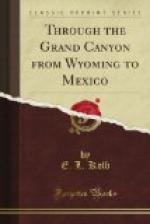Then the willow trees which were far distant on either shore began to close in and we travelled in a channel not more than a hundred feet wide, growing smaller with every mile. This new channel is sometimes termed the Bee River. It parallels the northern Mexico line; it also parallels a twenty-five mile levee which the United States government has constructed along the northern edge of this fifty-mile wide dam shoved across the California Gulf by the stream, building higher every year. Except for the river channel the dam may be said to reach unbroken from the Arizona-Sonora Mesa to the Cocopah Mountains. The levee runs from a point of rocks near the river to Lone Mountain, a solitary peak some distance east of the main range. This levee, built since the trouble with the canal, is all that prevents the water from breaking into the basin in a dozen places.
We saw signs of two or three camp-fires close to the stream, and with the memory of the stories haunting us a little we built only a small fire when we cooked our evening meal, then extinguished it, and camped on a dry point of land a mile or two below. I think we were both a little nervous that night; I confess that I was, and if an unwashed black-bearded individual had poked his head out from the willows and said, “Woof!” or whatever it is that they say when they want to start up a jack-rabbit, we would both have stampeded clear across the border. In fact I felt a little as I did when I played truant from school and wondered what would happen when I was found out.
Daybreak found us ready to resume our journey, and with a rising sun any nervousness vanished. What could any one want with two men who had nothing but a flat-bottomed boat?
All the morning we travelled west, the trees ever drawing closer as our water departed on the south, running through the willows, arrow-weed, and cat-tails. Then the channel opened into Volcanic Lake, a circular body of water, which is not a lake but simply a gathering together of the streams we had been losing, and here the water stands, depositing its mud. All the way across had no depth but a bottomless mud, so soft it would engulf a person if he tried to wade across.
On the west there was no growth. The shore was nothing but an ash-like powder, not a sand, but a rich soil blown here and there, building in dunes against every obstruction, ever moving before the wind. Here were boiling, sputtering mud pots and steam vents building up and exhausting through mud pipe-stems, rising a foot or two above the springs. Here was a shelter or two of sun-warped boards constructed by those who come here crippled with rheumatism and are supposed to depart, cured. Here we saw signs of a wagon track driven toward Calexico, the border town directly north of the lake. The heat was scorching, the sun, reflected from the sand and water, was blistering, and we could well imagine what a walk across that ash-like soil would mean. Mirages in the distance beckoned, trees and lakes were seen over toward the mountains where we had seen nothing but desert before; heat waves rose and fell. Our mouths began to puff from the reflected sun, our faces burned and peeled, black and red in spots. There was no indication of the slightest breeze until about three o’clock, when the wind moved gently across the lake.




